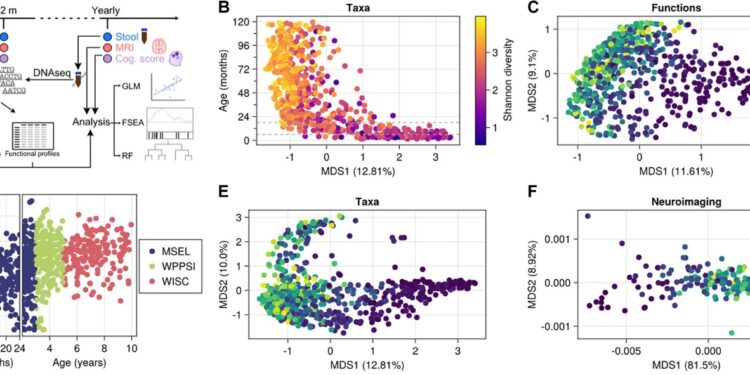The RESONANCE cohort is a diverse cohort with accelerated longitudinal sampling. (A) Stool samples, cognitive assessments, and neuroimaging were collected from participants at different ages throughout the first years of life. (B) Cognitive function scores are assessed by different tests, but can be standardized using large-scale composite scores. (C and D) Principal coordinate analysis using Bray-Curtis dissimilarity on taxonomic profiles demonstrates high beta diversity, with much of the first axis of variation explained by increasing age and diversity alpha. MSEL, Mullen Scales of Early Learning; WPPSI, Wechsler Preschool and Primary Intelligence Scale; WISC, Wechsler Intelligence Scale for Children. Differences in gene function profiles (E) and neuroimaging (Principal Component Analysis (PCA) based on Euclidean distance of brain region volumes) (F) are also dominated by changes as children age. Credit: Scientists progress (2023). DOI: 10.1126/sciadv.adi0497
Emerging evidence implicates the gut microbiome in cognitive outcomes and neurodevelopmental disorders, but the influence of gut microbial metabolism on typical neurodevelopment has not been explored in detail. Wellesley College researchers, in collaboration with other institutions, have demonstrated that differences in the gut microbiome are associated with overall cognitive function and brain structure in healthy children.
This study, published on December 22 in Scientists progress— is part of the ECHO program (Environmental influences on children’s health). This study examines this relationship in 381 healthy children, all part of the RESONANCE cohort in Providence, Rhode Island, providing new insights into early childhood development.
Research reveals a link between the gut microbiome and cognitive function in children. Specific gut microbial species, such as Alistipes obesi and Blautia wexlerae, are associated with higher cognitive functions. Conversely, species like Ruminococcus gnavus are more prevalent in children with lower cognitive scores. The study emphasizes the role of microbial genes, particularly those involved in the metabolism of neuroactive compounds like short-chain fatty acids, in influencing cognitive abilities.
Advanced machine learning models have demonstrated the ability of gut microbial profiles to predict variations in brain structure and cognitive performance, highlighting the potential for early detection and intervention strategies in neurodevelopment. This study represents an important first step in understanding the relationship between the gut biome and cognitive function in children.
Corresponding author Vanja Klepac-Ceraj notes: “This single cohort research offers exciting hypotheses that we now want to test in additional contexts. »
This research is the first to examine the gut-brain-microbiome axis in normal neurocognitive development in healthy children. The integration of linear models and multivariate machine learning to analyze the complex relationship between gut microbiome profiles and neurodevelopment is innovative. These models not only established the association of gut microbiota with cognitive function, but also predicted future cognitive performance based on microbial profiles in early life.
The results pave the way for the development of biomarkers for neurocognition and brain development. This research could lead to early detection of developmental problems and interventions, potentially alleviating long-term cognitive challenges. It highlights the importance of gut health in early childhood, suggesting dietary and lifestyle considerations for parents and healthcare providers. Furthermore, this study marks the first step in formulating hypotheses that can be tested experimentally and in animal models.
More information:
Kevin S. Bonham et al, Gut-resident microorganisms and their genes are associated with cognition and neuroanatomy in children, Scientists progress (2023). DOI: 10.1126/sciadv.adi0497
Provided by Wellesley College
Quote: Study reveals relationship between gut microbiome and children’s brain development and function (December 27, 2023) retrieved December 27, 2023 from
This document is subject to copyright. Apart from fair use for private study or research purposes, no part may be reproduced without written permission. The content is provided for information only.



